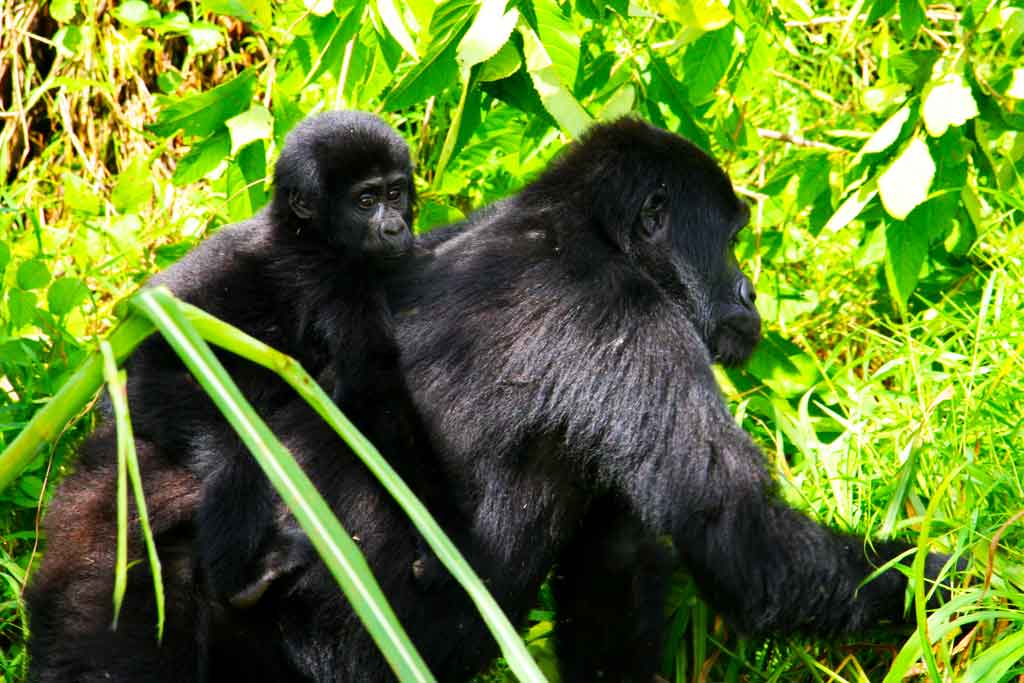Mountain gorillas are scientifically known as ‘Gorilla beringei beringei’, and they are one of the two subspecies of the eastern gorillas. They are a few unique and massive animals (apes) on earth with 98 percent of their DNA the same as that of humans.
Mountain gorillas are listed on both the IUCN red list and African Wildlife Foundation, as one of the most endangered species because they are at risk of getting extinct in the wild. Currently, these animals remain slightly above 1,000 on earth and a large section of them exist in the lush rainforest of Bwindi Impenetrable National Park while others are in the Virunga mountain ranges. These include Virunga National Park in the eastern Democratic Republic of Congo (DRC), Volcanoes National Park in northwestern Rwanda and Mgahinga Gorilla National Park in southwestern Uganda. Besides, Bwindi accounts for over 460 mountain gorillas, that is nearly half the world’s population.

Where do mountain gorillas live?
Mountain gorillas are not found in zoos, because they thrive only in natural habitats and only in the rainforests of Africa. In Uganda, they are found in Bwindi Impenetrable National Park and Mgahinga Gorilla National Park. The two national parks are located in southwestern Uganda, approximately 8-10 hours’ drive from Kampala, the capital city of Uganda.
A larger section of these great apes live in Uganda and they account for about 21 habituated gorilla families with 20 of them in Bwindi and only one in Mgahinga.
Bwindi is home to nearly half the total world-wide population of mountain gorillas inhabited in four (4) main trailheads. That is, Buhoma in the north, Ruhija in the east, and Rushaga and Nkuringo in the south.
Gorilla trekking in Mgahinga Gorilla National Park is done at Ntebeko, which makes them five (5) locations where gorilla treks are done, in Uganda.
The lifestyle of gorillas in Bwindi
Mountain gorillas live in families ranging from 6-35 members. Each gorilla group is led by a mature male gorilla, the silverback, with more than one female, infants, and juveniles. An adult silverback gorilla weighs about 120 kilograms and is responsible for protecting other members from intruders.
Females have a gestation period of about 8 months and a newly born baby gorilla can weigh about 1-2 kg. After about 40 weeks, a baby gorilla can start walking and at 3 years, they slowly become independent.
At 6 years, a baby gorilla is 1.2 meters tall and can weigh about 70 kilograms. Females can take 4 years to give birth to another baby gorilla and they can give birth to 3 to 6 babies in their lifespan. Males become mature at 10 years and can then father about 10 to 20 offspring within 50 years.
The daily life of mountain gorillas in Bwindi
Mountain gorillas start their day as early as 6:00 am and begin to look for what to eat. 30 percent of their time in a single day is spent gathering food and traveling while 40 percent is spent resting. They usually rest in the afternoon and build new nests to retire for the night in the evening
These great apes depend on vegetation, mainly on stems, leaves, shoots, and at times insects. An adult mountain gorilla can feed up to 60 pounds of vegetation each day.
Mountain gorilla trekking in either Bwindi Impenetrable or Mgahinga Gorilla national parks requires you to have a gorilla tracking permit. Each gorilla trekking permit in Uganda costs US$ 700 per person per trek.
Note, only 8 visitors are allowed to trek one habituated group each day, and only one hour is given to you to have a face-to-face encounter with these massive animals in the wild.
